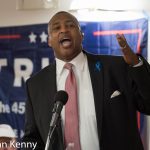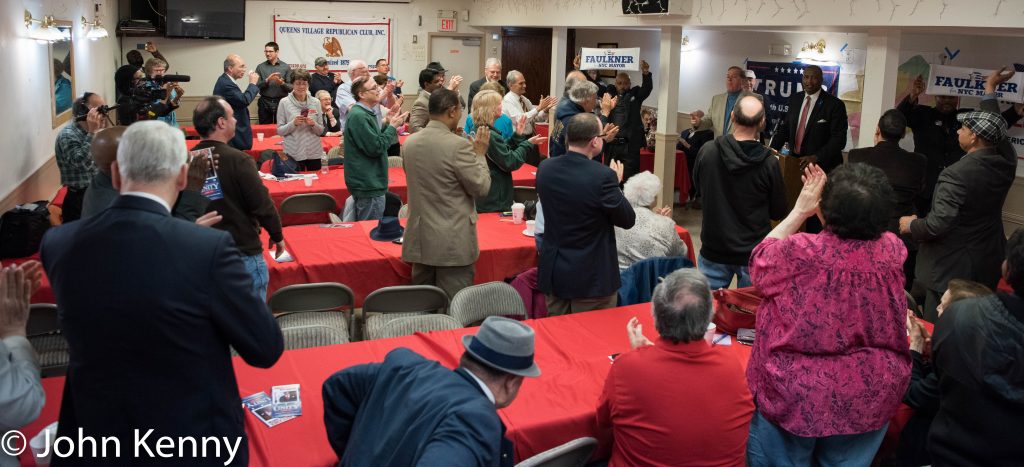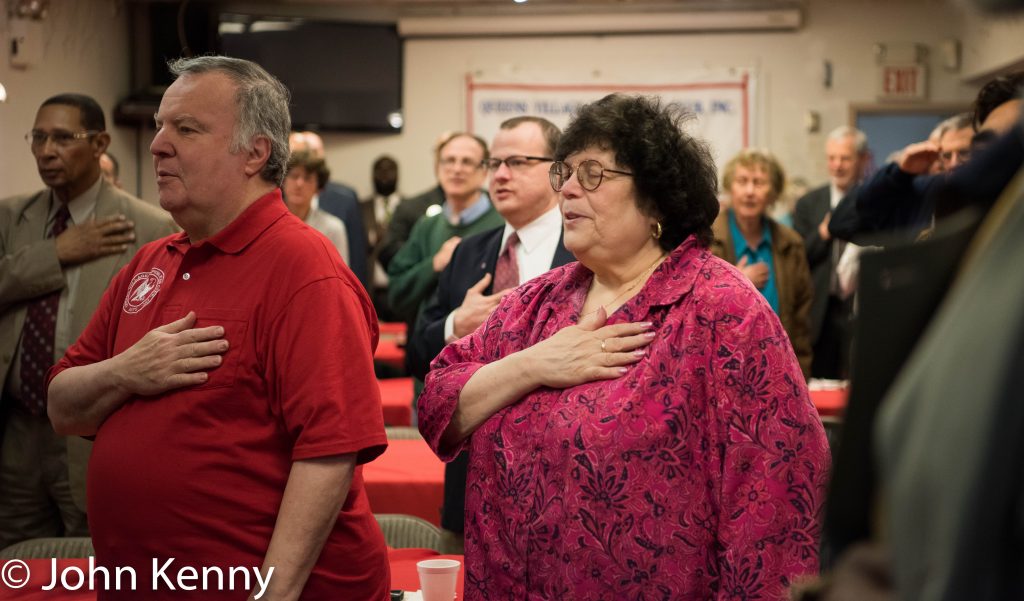 The New York City Republican Party has had “the right message but for years we have not had a messenger who could deliver it to allll the communities. I’m telling you, right now, I am that messenger.” That was at the core of Republican mayoral candidate Michel Faulkner’s pitch to the Queens Village Republican Club in a recent visit. Faulkner’s fiery speech drew a standing ovation, far exceeding rival Paul Massey’s reception the prior month, although enthusiasm waned as he dealt with audience questions.
The New York City Republican Party has had “the right message but for years we have not had a messenger who could deliver it to allll the communities. I’m telling you, right now, I am that messenger.” That was at the core of Republican mayoral candidate Michel Faulkner’s pitch to the Queens Village Republican Club in a recent visit. Faulkner’s fiery speech drew a standing ovation, far exceeding rival Paul Massey’s reception the prior month, although enthusiasm waned as he dealt with audience questions.
Faulkner does differ from most New York Republican candidates. He’s a Baptist minister and African-American who cites Jerry Falwell Sr. as a “political mentor [and] spiritual father.” Low on money but high on energy, the 6’4″ Faulkner’s religious roots infuse his appearances as he preaches politics. He’s fluid at the mic, quickly revving up as he attacks Bill de Blasio with his energy filling the room. He’s spotty on many issues, however, often displaying a lack of significant depth on specific topics.
Faulkner spoke to about about 50 people at the monthly Queens Village Republican Club in a Glen Oaks Knights of Columbus hall in early April. The Club bills itself as the America’s oldest Republican club, and it has long been a conservative outpost. From my observations at the past two monthly meeting and the Club’s recent Lincoln Day Dinner, demographically it skews older (mostly 50+) and white. It membership includes some non-white members as well, with some pockets of engagement from Korean-Americans and the Pakistani Christian community.
Faulkner touched many prototypical Republican positions, describing himself as in support of gun rights, against abortion, providing a “hand up, not a hand out” and in favor of fully enforcing immigration laws. Those positions, aligned around the theme of “freedom,” resonated with audience members. He lost some of that resonance when he moved beyond the broad theme of gun rights and the Second Amendment, saying that “I do not believe” in an unfettered right to gun ownership in New York City or within 25 miles of New York City. He also lost some steam when he avoided a detailed discussion on affordable housing, saying that he was not prepared to talk “specifics.”
Faulkner declared that “sanctuary cities nonsense … bothers me so much” and defended President Trump as “not anti-immigrant”, but “anti-criminal illegal immigrant.” He retreated from his broad declaration though, concluding that we need “immigration reform” while not allowing “criminals” to stay in the U.S.
He did not demonstrate any stronger knowledge on crime fighting and public safety, beginning by stating that “statisticians will tell you crime is down, but read the fine print.” Crime has continued to fall markedly during the de Blasio administration, but it’s a problematic reality that all of the Republican mayoral candidates try to finess. Faulkner cited an increase in shootings from 48 in February to 49 in March as support for his characterization. In fact, according to the NYPD, there were 48 shootings in March. More meaningfully, the 48 shootings in March were a significant decrease from the 67 shootings in March 2016. That year-to-year comparison for the same period is generally regarded as much more significant but didn’t figure into Faulkner’s analysis. He similarly misstated the counting of murders, saying that “if you get shot that counts as a shooting, even if you die three days later it’s not a murder.” That’s not correct, although it buttressed Faulkner’s initial remark that “I don’t know how CompStat works.”
On abortion, Faulkner pronounced himself “solidly pro-life, unapologetically pro-life” but also pointed out that “the laws of New York City are what I’ll take an oath to.” He expressly said that he was limiting his comments, however, because “I am being recorded right now” (by me, the only reporter present, and you can see this and his complete presentation below) and expressed fear that he’ll be “hammered over this issue” in the general election and that “everything that I’m saying the de Blasio camp is going to use against me.”
Faulkner was adept at attacking Mayor de Blasio, fully embracing the notion that New York City has returned to being a hellhole and assigning responsibility to de Blasio. Faulkner’s bio includes coming to New York City in 1988 to open a Times Square soup kitchen. As he accurately points out, 1988 Times Square was a profoundly different place, a crime-ridden underbelly of New York oozing with prostitution and street crime rife with desperate victims and perps. Having the heart and the gumption to choose to go there is a compelling piece of Faulkner’s story, but he then proceeded to declare that “when I see the reversal of all that we have gained it makes me sick to my stomach.” Whatever he considers to have been reversed New York City is not remotely like the city it was in 1988. Faulkner, like his fellow mayoral challengers, are running against a City that doesn’t presently exist. It’s a city in which crime is exploding and danger always lurks. Unfortunately for their campaigns, but fortunately for the City, that’s not reality. There are of course many major issues in New York City, with affordability, school quality, housing availability, traffic and mass transit woes among them, but sparking campaign excitement on them is a challenge that flummoxes Faulkner and his fellow challengers.
His audience shared many of Faulkner’s views, especially a visceral dislike of de Blasio. They were intrigued by him, drawn to his energy and presence and sharing his view of freedom as a touchstone for other issues. His response on guns was decidedly contrary to most of their views but his opposition to abortion was consistent with theirs. His audience seemed to consider his lack of knowledge on large issues but to not have immediately decided against him as a result. Instead, his audience seemed genuinely interested in Faulkner and open to supporting him.
Video:
Here is Faulkner’s full speech:
Here is the full Q&A:


